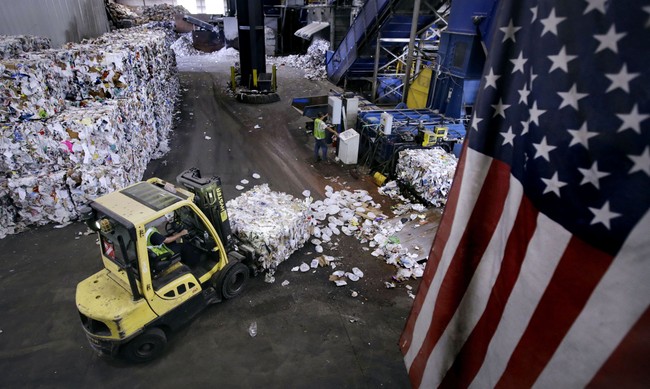Share this @internewscast.com

In today’s corporate landscape, many companies assert that they are “designing for the environment.” However, this often translates to following the directives of the Association of Plastics Recyclers (APR).
It is important to note that APR is neither an environmental nonprofit nor a scientific entity. It is, rather, a trade association. Its mission is not aligned with environmental stewardship or public good but is instead focused on safeguarding the mechanical recyclers’ business model. Nationwide, both retailers and consumer brands have effectively permitted APR to influence packaging policy, delegating crucial sustainability decisions to an organization that lacks public accountability.
This didn’t happen by accident. It was a calculated public affairs coup.
APR positions itself as an impartial expert on recycling, thus becoming the unofficial authority on “recyclable” packaging. Brands often adhere to APR’s “Design Guide for Plastics Recyclability” as if it were inviolable. Consequently, APR’s inclinations—which notably tend to increase expenses, support existing players, and discourage alternatives—are adopted as obligatory principles rather than ideas open to challenge.
The foundation of APR’s influence—that America faces a plastic waste crisis—is a myth. The data simply doesn’t support that narrative. According to industry analyses referencing data from the Environmental Protection Agency (EPA), the United States has more than 60 years of landfill capacity remaining. Though there is variation between states, most have ample infrastructure to handle projected volumes. Plastics, meanwhile, account for only about 18 percent of waste by weight, according to the EPA. Moreover, the United States generates less plastic per capita than many developing nations, where the real pollution crises lie.
And when it comes to ocean plastics—the most emotionally charged part of the narrative—the United States plays a minor role. Studies estimate that more than 86 percent of ocean-bound plastic waste comes from Asia. The United States contributes about three percent of total waste, ranking 20th overall. China and India alone are responsible for nearly one-third of all mismanaged plastic waste globally.
The so-called crisis, in other words, is not being driven by Americans’ plastic use. And American brands aren’t responding to consumer demand or hard science. Rather, they are responding to activist campaigns, ESG consultants, and regulatory pressure. Very few are willing to challenge the flawed premise that we’re in the midst of an environmental emergency.
APR has pulled off something remarkable but all too common in today’s age. It has cloaked its trade priorities in the language of sustainability, allowing its design standards to spread across entire industries without serious scrutiny.
Brands that comply get to call their packaging “recyclable.” Lawmakers and regulators often codify APR’s framework into official policy. Environmental groups, eager to support anything labeled circular or zero-waste, rarely question the mechanics. But this is where the problem begins.
APR’s rules offer no guarantee that packaging will actually be recycled. “Recycle-ready” means a package could be recycled—if the infrastructure exists, if a market buyer can be found, and if a recycling facility chooses to process it. That’s a long chain of contingencies. In practice, many packages with the “recyclable” label end up in landfills, incinerators, or are shipped to countries like Vietnam or Indonesia, where they are more likely to be burned than reused.
A 2022 Greenpeace USA report found that less than six percent of plastic waste in the United States is recycled. That means more than 94 percent of plastic—much of it labeled recyclable—never completes the circular loop consumers are led to believe exists.
Meanwhile, the cost of playing by APR’s rules isn’t theoretical. Brands often must reengineer their packaging to meet APR’s specifications, which can involve switching to more expensive materials, altering shapes or adhesives, or redesigning entire product lines. These costs are passed directly to consumers—and they rarely result in actual environmental gains.
In fact, many APR-approved packages use more resources and energy to produce than their conventional counterparts. When those packages aren’t recycled, the net environmental impact is worse than if brands had used simpler, more efficient designs. Compliance becomes performance. And performance becomes policy.
One of the clearest indicators of APR’s self-interest is its stance on chemical recycling. Unlike mechanical recycling, which is limited to certain polymers and degrades material quality, chemical recycling can break down a broader range of plastics into base feedstocks. It has real potential to scale down plastic recovery and reduce landfill dependency. For APR, chemical recycling threatens its existing model. The association has repeatedly warned that advanced recycling isn’t a “silver bullet,” advocating for limited definitions of the practice and cautioning against falling for marketing claims.
The irony is that brands follow APR’s rules taking credit for being good environmental stewards by acting sustainability—or at least appearing to act as sustainability—when in fact they are locking themselves into a narrow, underperforming system. Retailers like Walmart and others now defer to APR’s guidelines as default policy. But by doing so, they’ve ceded critical decision-making power to a self-interested industry body. In effect, they’ve allowed a trade group to define what counts as good environmental citizenship—and handed over the authority to enforce it.
This entire system is based on PR-driven regulatory capture. A manufactured narrative has been monetized, and consumers, innovators, and honest actors are left footing the bill.
The United States doesn’t have a massive waste crisis. The real crisis is the willingness of corporations and governments to uncritically outsource policies to trade groups selling themselves as both environmental saviors and corporate champions. Real environmental progress starts with honesty and an evaluation of tradeoffs, neither of which APR is interested in.
It’s time for brands, regulators, and consumers to ask harder questions about who writes the rules—and who benefits when we follow them.
H. Sterling Burnett, Ph.D., ([email protected]) is the Director of the Arthur B. Robinson Center on Climate and Environmental Policy and Jack McPherrin is a Research Fellow for the Glenn C. Haskins Emerging Issues Center, both at The Heartland Institute, a non-partisan, non-profit research organization based in Arlington Heights, Illinois.
















